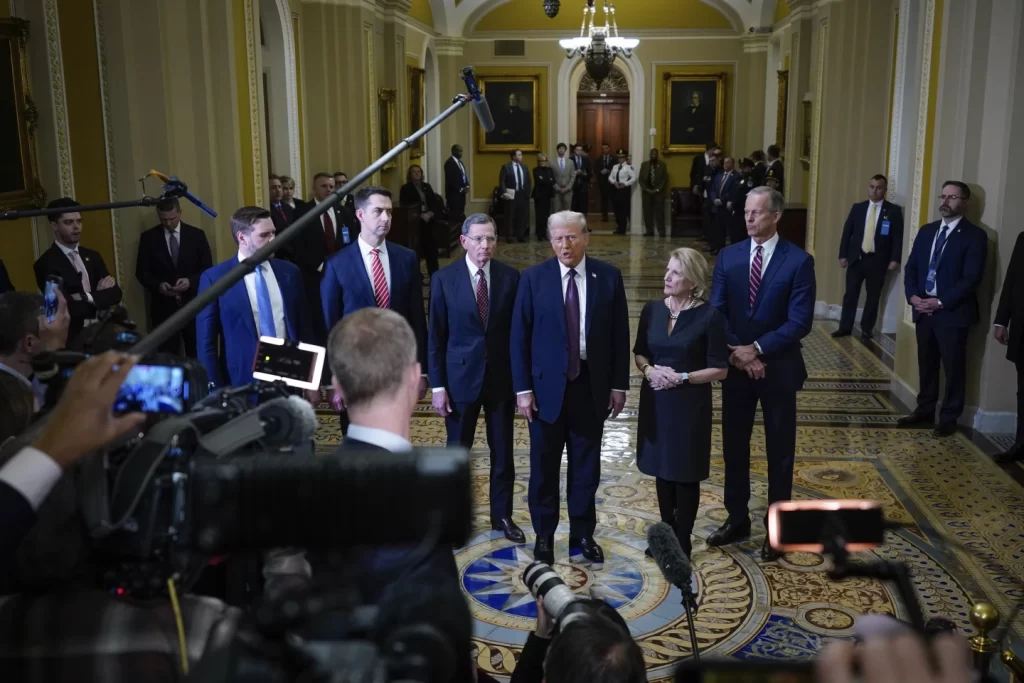
WASHINGTON — President-elect Donald Trump is preparing more than 100 executive orders starting Day One of the new White House, in what amounts to a shock-and-awe campaign on border security, deportations and a rush of other policy priorities.
Trump told Republican senators about the onslaught ahead during a private meeting on Capitol Hill. Many of the actions are expected to launch on Inauguration Day, Jan. 20, when he takes office. Trump top adviser Stephen Miller outlined for the GOP senators the border security and immigration enforcement measures that are likely to launch soonest. Axios first reported on Trump and his team’s presentation. “There will be a substantial number,” said Sen. John Hoeven, R-N.D.
Allies of the president-elect have been preparing a stack of executive orders that Trump could sign quickly on a wide range of topics – from the U.S.-Mexico border clampdown to energy development to federal Schedule F workforce rules, school gender policies and vaccine mandates, among other day-one promises made during his campaign.
While executive actions are common on the first day of a new White House, as a new president puts a stamp on certain priorities, what Trump and his team are planning is an executive punch unseen in modern times as he prepares to wield power in untested ways, bypassing the legislative machinery of Congress.
Some could be significant, others could be more symbolic messages of the new president’s direction.
Senators briefed by Trump and his team during a lengthy session at the Capitol this week are expecting the new administration to rollback many of the Biden administration executive orders while putting his own proposals in place.
Finishing the U.S-Mexico border wall, setting up immigration detention facilities where migrants could be housed until they are expelled are all part of the mix – some $100 billion in proposals, senators said, that incoming Trump administration and the GOP Congress are working to fund as part of their big budget reconciliation legislation.
Senators expect Trump to revert back to many of the same U.S-Mexico border measures in place during his first term – including those that require migrants to apply in other countries or remain in Mexico, rather than enter the U.S., while their claims are being processed – as well as massive enforcement actions to deport those currently in the U.S. without legal authority.
Sen. James Lankford, R-Okla., who led negotiations on border security and immigration during the last Congress, said he expects the Trump team to focus initially on an estimated 1 million migrants who he said most recently entered the country, have been convicted of crimes or who courts have otherwise determined are otherwise ineligible to stay in the U.S.
“That’s the low-hanging fruit,” Lankford said. “People that recently crossed, people that were legally present and committed other crimes, people that the court has ordered them removed – that’s well over a million people. Start working through that process.”
Trump himself once mused during the presidential campaign about having a “tiny desk” at the Capitol on Inauguration Day, where he would sit and quickly sign his executive orders.
While there are no public signs he is considering that, the Republican senators are planning to welcome Trump inside the building after he takes the oath of office. The new president would typically sign the paperwork needed for the formal nominations of his Cabinet and administrative picks.
Many of Trump’s choices for top administration jobs are going through Senate confirmation hearings this upcoming week. Traditionally, the Senate begins holding votes on a president’s nominees as soon as he takes office, with some even being confirmed on Inauguration Day.
“That would be nice,” said Senate Majority Leader John Thune, who said senators are still awaiting background checks and other paperwork for many of Trump’s picks. “We’ll see.”



